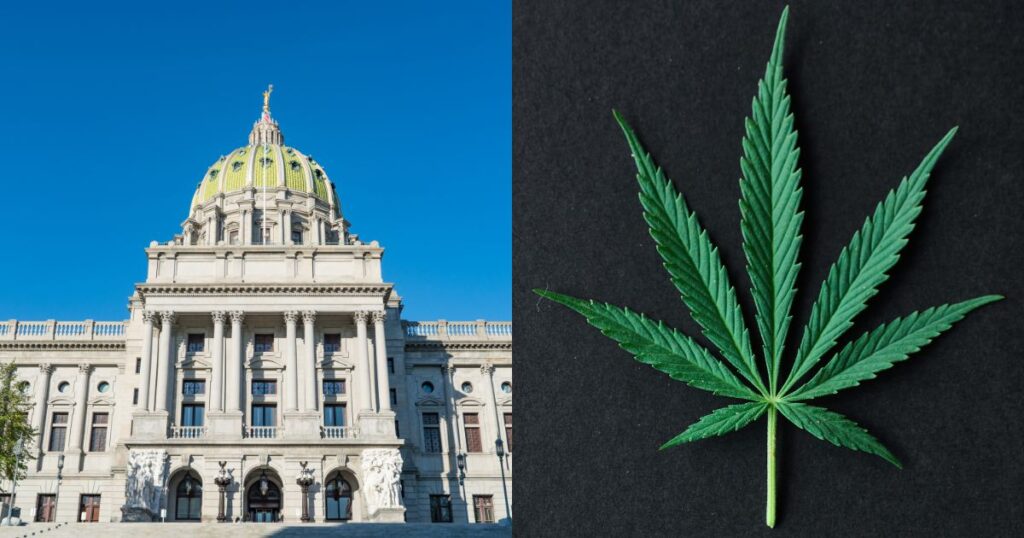The road to cannabis legalization has just taken a significant turn in Pennsylvania, as the state’s House Health Committee recently approved House Bill 1200. This bill establishes a framework for legalizing recreational marijuana, aiming to regulate its sale and use across the state. However, the path laid out by HB 1200 comes with both opportunities and challenges, particularly the controversial proposition that Pennsylvania’s cannabis retail would be run exclusively through state-controlled stores.
What is HB 1200?
House Bill 1200, introduced by Representatives Rick Krajewski and Dan Frankel, proposes the legalization of recreational cannabis for adults aged 21 and older in Pennsylvania. The bill covers not just the ability to buy and use marijuana but also addresses cultivation, licensing for cannabis businesses, and social equity initiatives to repair harms caused by prohibition.
Most notably, the legislation would put the Pennsylvania Liquor Control Board (LCB) in charge of cannabis sales. Under this framework, cannabis would be sold exclusively through state-run stores, akin to the model for liquor sales in Pennsylvania. This unique structure has drawn both support and criticism from different corners of the legalization debate.
The Good News for Cannabis Advocates In Pennsylvania
HB 1200 brings an exciting opportunity for Pennsylvania to join the growing list of states that have fully legalized marijuana. With most neighboring states already permitting recreational use, Pennsylvania risks falling behind economically if it doesn’t take action.
At its core, HB 1200 includes several progressive and forward-thinking provisions aimed at addressing social, economic, and individual freedoms.
Social Justice and Expungements
One of the most impactful elements of HB 1200 is its focus on social justice. The bill seeks to address longstanding racial disparities in cannabis enforcement by implementing automatic record clearing for minor cannabis offenses. Which is a step toward reversing the harm caused by decades of criminalization, especially in communities disproportionately affected by the failed war on drugs.
Equity in Business Opportunities
HB 1200 aims to build an inclusive cannabis industry by prioritizing licensing and resources for social equity applicants. The bill establishes a Social and Economic Equity Advisory Committee to empower entrepreneurs from historically impacted communities. This committee will provide grants, low-interest loans, and training programs to help ensure equitable participation in the cannabis market.
Community Reinvestment
A significant portion of the tax revenue generated by cannabis sales would be reinvested in the communities most affected by prohibition. This funding would be allocated to projects such as infrastructure development, affordable housing initiatives, and other critical community improvements.
Home Cultivation Rights
HB 1200 also recognizes personal freedom by allowing adults to cultivate cannabis at home. With a home cultivation permit, individuals can grow up to two mature and two immature cannabis plants for personal use.
Consumer Protections
To further normalize and protect cannabis use, the bill includes practical consumer protections. For example, it prevents cannabis use from being used as grounds to disqualify individuals from accessing medical care, employment, or custody of children. These measures help ensure safety and fairness for marijuana consumers.
State-Controlled Cannabis Sales: A Drawback
While HB 1200 is undoubtedly a step forward, the aspect of state-controlled cannabis retail has raised considerable concern. Under the current proposal, only the Pennsylvania Liquor Control Board would operate stores selling cannabis. This would give the state a monopoly over cannabis sales, forcing consumers and businesses to operate within the rigid confines of a government-run system.
The drawbacks of this model are hard to ignore. Critics argue that a state-controlled retail system could stifle market innovation. Private cannabis businesses thrive on competition and creativity, offering unique products and experiences to consumers. If the state takes exclusive control, it could stifle dynamism and reduce options for customers.
Another concern is the potential to alienate consumers. Opinion polls consistently show that Pennsylvania residents prefer private, licensed businesses over state-run models. An overly bureaucratic and monopolized system could frustrate cannabis users who value flexibility, convenience, and competitive pricing.
Additionally, a state monopoly on retail operations may undermine small entrepreneurs. It limits opportunities for local and small businesses to enter the lucrative cannabis market, concentrating power exclusively in the hands of the government.
What Does HB 1200 Mean for Pennsylvania Recreational Marijuana?
For Pennsylvania, the stakes are high. HB 1200 has the potential to generate significant revenue, improve public health outcomes, and create new jobs in a regulated cannabis industry. Beyond its financial promise, this bill also represents an opportunity to begin repairing the generational damage caused by cannabis prohibition.
However, the fate of HB 1200 remains uncertain, with party lines dividing support for the legislation. While the bill garnered approval in the House Health Committee by a margin of 14–12 (with Republicans opposing it), its future in the Republican-controlled state Senate is far less certain.
Road Ahead
For cannabis advocates and Pennsylvanians supporting legalization, the passage of House Bill 1200 would be a major step forward in transforming the state’s cannabis policy. A vote in the House of Representatives could happen as early as today, and if it passes, the bill will move to the Senate for further consideration. To make this vision a reality, proponents must push for changes to the state-run store mandate, advocating instead for a system that includes private businesses operating within a well-regulated framework.
Pennsylvania doesn’t need to reinvent the wheel. Nearby states like Ohio, New Jersey, and Massachusetts show how recreational cannabis legalization can succeed when private entities collaborate with government oversight. These models provide the economic benefits Pennsylvanians want while preserving consumer choice and encouraging new entrepreneurs.
The bottom line? It’s time for Pennsylvania to move forward with legalization—but with a framework that best serves both its citizens and the industry’s potential for growth.
















